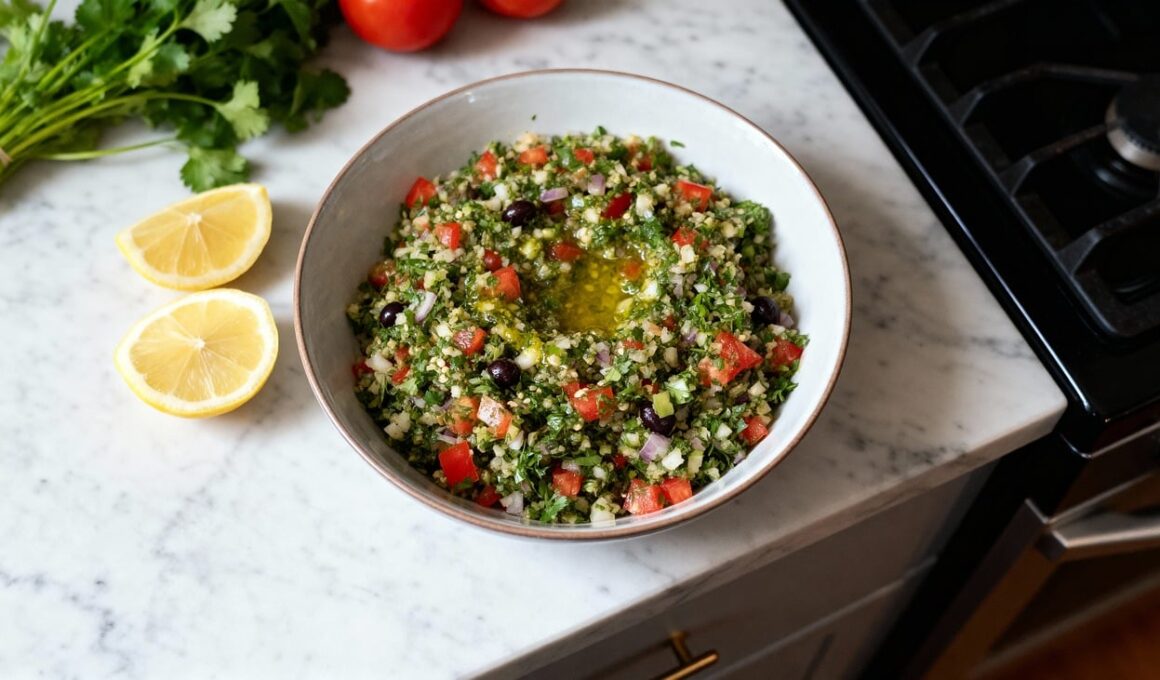Mediterranean Diet Meal Planning: Tips and Tricks
The Mediterranean diet is not just a meal plan; it’s a lifestyle that emphasizes whole foods, healthy fats, and plenty of fruits and vegetables. When planning meals, it’s essential to focus on seasonal and locally sourced ingredients, as these are often the freshest and most flavorful. Start by assessing your weekly schedule and pick one day to prepare meals in advance. This helps minimize the temptation of opting for less healthy alternatives when time is tight. Incorporate whole grains such as quinoa, brown rice, and whole-grain pasta into your meals. Lean proteins, particularly fish and legumes, are foundational elements of this diet. Healthy fats from olive oil and nuts should be included in moderation. By planning your meals around these guidelines, you can enjoy the numerous health benefits of adhering to a Mediterranean-style diet. Not only will you be supporting your body, but you’ll also cultivate a rich appreciation for diverse flavors, ultimately transforming your approach to eating. Get inspired by Mediterranean recipes and explore different variations that meet your dietary needs.
One of the most enjoyable aspects of Mediterranean meal planning is the ability to create vibrant, colorful dishes full of flavor. You can start by making a list of staple ingredients that you will frequently use. These may include fresh herbs like basil, parsley, and mint, as well as olives, tomatoes, and various vegetables. Consider incorporating a diverse mix of protein sources to keep your meals exciting. Rotate between fish such as salmon and sardines, poultry like chicken, and plant-based proteins like chickpeas and lentils. Don’t forget to experiment with spices; using herbs and spices can elevate simple ingredients into gourmet meals without the addition of excessive calories. To aid your meal preparation, utilize a weekly calendar for planning your breakfast, lunch, and dinner. Planning can help you manage portion sizes and control any potential impulse eating. Additionally, remember to track your grocery list so you have everything on hand when you’re ready to cook. A good inventory of your kitchen staples will make cooking simpler and more efficient.
Incorporating Seasonal Ingredients
Another essential tip for Mediterranean meal planning is to incorporate seasonal ingredients into your diet. Eating according to the seasons ensures that your meals are fresh and nutritious while supporting local agriculture. Seasonal produce is usually more affordable and flavorful, making it a beneficial choice. For example, in the spring, you can enjoy asparagus and fresh peas, while summer brings an abundance of tomatoes, cucumbers, and zucchini. Fall and winter seasons offer roots like carrots, beets, and greens such as kale and spinach. Always check with local farmers’ markets to discover what’s available in your area. Not only does this support your community, but it also connects you to the natural rhythms of the earth. By adjusting your meals based on seasonal availability, you can also challenge yourself to try new recipes and cooking methods. Experimenting with different preparations can make the experience of cooking enjoyable and fulfilling. Finally, embracing seasonal cooking creates an opportunity to teach your family about food in a fun and interactive way.
When planning your Mediterranean meals, don’t forget about the importance of portion control. Focus on filling your plates with nutrient-dense foods while being mindful of your servings. A typical Mediterranean plate might consist of half vegetables, a quarter lean protein, and a quarter whole grains. To practice this method easier, using smaller plates can trick your brain into feeling satisfied with less food. Additionally, embrace meals that are designed for sharing; many Mediterranean traditions involve communal dining. This encourages everyone to try a little bit of everything and creates a pleasant atmosphere around the table. Prepare dips, such as hummus or baba ghanoush, to accompany whole grain pita or veggie sticks, promoting a healthy and interactive appetizer spread. Be sure to stay hydrated by drinking water or herbal teas. Infusing your water with citrus or mint can also enhance the experience and keep you refreshed throughout your meals. It is essential to listen to your body’s hunger cues; eating slowly allows you to enjoy your food and recognize when you’re satisfied.
Meal Preparation Techniques
To enhance your Mediterranean meal-planning experience, implementing effective meal preparation techniques can make a significant difference. Start by batch cooking grains or legumes at the beginning of the week, allowing you to mix and match ingredients as you prepare meals. Storing pre-portioned ingredients in your fridge or freezer can save time for quick weeknight dinners. Invest in quality containers to keep food fresh and organized. Keep a rotation of prepared sauces and dressings that complement Mediterranean flavors; these are easy to make and can transform a simple dish into a culinary delight. Classic ingredients like tzatziki, vinaigrettes, and tomato-based sauces can enhance flavor while offering you variety. Moreover, marinating proteins can also save time while providing great taste; letting meats soak up herbs and spices overnight can elevate their flavor profile. Make your plan for special family meals, exploring family recipes that focus on fresh, wholesome ingredients. Sharing these dishes can create a sense of community and connection, enhancing the overall dining experience.
Shopping smart is key to successful Mediterranean meal planning. Being organized with your grocery list can streamline trips to the market and lessen impulsive buys. Consider shopping at local farmer markets, where you can find seasonal produce and establish relationships with local vendors. They can offer insights into the best items available or upcoming seasonal changes. Additionally, don’t shy away from participating in community-supported agriculture (CSA) programs, where you can receive regular deliveries of fresh produce at affordable rates. Always remember to focus on whole foods and avoid processed options as much as possible. When shopping for pantry staples, choose items like canned beans, whole grains, nuts, and healthy oils. These will become your foundation for many meals. Investing in a variety of fresh herbs and spices can also boost the flavors of your dishes without additional calories. Create a budget that allows for flexibility, enabling you to invest in high-quality and organic options when possible. Lastly, prioritize shopping around the perimeter of the store, where fresh produce and proteins are usually located.
Staying Inspired and Motivated
Lastly, stay inspired and motivated in your Mediterranean meal-planning efforts. Following food blogs, social media accounts, and cooking shows dedicated to Mediterranean cuisine can provide fresh ideas and motivation. There is an abundance of resources available that cater to adults and families with different diets and preferences. Join community cooking classes or workshops to learn from professionals, gain skills, and make new friends at the same time. Don’t hesitate to involve your family in meal preparation, allowing them to learn and discover new culinary techniques alongside you. You can host theme nights featuring regional Mediterranean cuisines, exploring different countries’ tastes. Take time to connect with friends over shared meals, celebrating special occasions or casual get-togethers. Most importantly, remember to enjoy the process; experiment with flavors, textures, and cooking techniques without fear of failure. Discover what works for you, as the Mediterranean diet embodies creativity and joy in food. Purposefully nurturing this relationship between cuisine and culture can lead to a deeper appreciation of the Mediterranean lifestyle.


